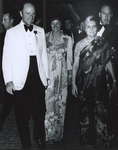The Shaw Festival Oral History - Margherita Howe
- Creators
- Howe, Margherita (1921-2006), Interviewee
- Cameron, Don, Interviewer
- Media Type
- Text
- Audio
- Item Type
- Interviews
- Description
- Interview with Margherita Howe about the first years of the Shaw Festival Theatre.
Transcription only; audio file not available. - Notes
- Part of Shaw Festival Foundation Oral History Project
- Date of Publication
- 8 Apr 1986
- Subject(s)
- Personal Name(s)
- Howe, Margherita (1921-2006)
- Local identifier
- ShawFest00010
- Language of Item
- English
- Geographic Coverage
-
-
Ontario, Canada
Latitude: 43.25012 Longitude: -79.06627
-
- Copyright Statement
- Copyright status unknown. Responsibility for determining the copyright status and any use rests exclusively with the user.
- Location of Original
- Shaw Festival Library
- Contact
- Niagara-on-the-Lake Public LibraryEmail:localhistory@notlpl.org
Website
Agency street/mail address:10 Anderson Lane P.O. Box 430
Niagara-on-the-Lake, ON L0S 1J0
905-468-2023 - Transcription
MARGHERITA HOWE
April 8, 1986
MARGHERITA HOWE: You've interviewed a lot of people, obviously, and I was thinking this morning that you would probably have had all very positive comments. I don't know how much you would ever want to say in a retrospective about the feelings early on, which were not always positive, and certainly there was a lot of, what should I say, there were a lot of niggling feelings between particularly Brian, for instance, and the rest of us who were doing, you know, the joe jobs, and I think that caused a few problems. I think those of us who were working our hearts out early on were doing it not so much for Shaw, the theatre, as for the town and I think maybe we found some merit that there would be something good for the town come out of this. It wasn't that we were Shaw or even theatre enthusiasts but it was the town, I think that made us do it. And we really did work terribly hard.
I can remember Audrey Wooll and I seemed to be responsible a lot of the time for the opening nights and I can remember we would bring out tablecloths and our silverware and the candelabra and silver dishes and trays, etc. This was, of course, up in the small hall of the Court House. And I remember that Betty Rigg was absolutely super on flowers, I mean, she would make these most gorgeous enormous flower arrangements. And of course Brian would come in and, really, other than to say maybe, "We need more silver on the table, my darling," we heard nothing and then we could practically kill him, so as I say, there were a lot of those feelings early on and it wasn't all sweetness and light.
INTERVIEWER: We heard that there was tremendous enthusiasm to begin with and then it sort of dribbled away and just a few people were left who were really interested and did things.
MARGHERITA HOWE: Well, I think that eventually, and I can't remember the year—I've been trying to pinpoint Audrey on this—eventually I got a little tired of this whole thing. I can remember walking up those back stairs (fire escape) of the Shaw Festival with these boxes of silver and boxes of plates for the opening nights and saying to Audrey, I remember this so clearly, "I'm going to have a heart attack!" and then Audrey saying, "Damn it all, I'm going to have one, too." And the two of us slugging on, and of course that was 25 years ago and we were about 40 then, but anyway, I think that eventually we got a little fed up.
I can remember suggesting that there seemed to be more people coming in, suddenly it got to be that it might be the smart thing to belong to this crew, you see, so I said to Audrey, "What we'll do is call a meeting, form a ladies auxiliary or whatever and then I'm getting out." I remember Audrey said she would have this meeting at her house, which she did, and there was a bit of enthusiasm at that time and people felt that it might be the right thing to do. So the Guild was formed and Audrey sort of backed down shortly after and certainly I backed down and there was this larger group of women ready to work and to organize it in a proper fashion because it really was pretty slapdash, it was just a group of women, not the least organized in any structured way. But we did work hard. You kept being propelled into it; you couldn't stop it—that was the problem—because the theatre went on every year and you were back into the same old thing every summer.
And then, of course, there was the antagonism when the different locations for Shaw were proposed; that was later on, but I think certainly we did the opening nights and we did the after-the-theatre parties out at Rands' and we made the food. I remember when we had about 90 doctors come for a seminar—what did we have, a lunch, dinner and the next day's lunch? It was all voluntary and we really did it, and I suppose what really upset us was the fact that we really didn't get very many thanks. We were absolutely ignored and I think that was the problem. Brian simply thought we were as enthused about the theatre, but I think that eventually got to us. I remember I was also involved in the orange juice and at the end of the year—you know, you go up night after night into that hot town hall—and at the end of the year they'd come and say, "Where's the money?" You know, it might be $1,500 or $2,000 and they were damn glad to get it, but not— They didn't use their heads.
INTERVIEWER: Were you involved in any productions, backstage?
MARGHERITA HOWE: With props, yes, and again it meant scavenging from people's homes, and then we became very apprehensive because they weren't looked after and that caused problems. I can remember one settee that somebody had lent and it turned out that they had painted the damn frame and they covered the settee and all these crazy things, and so you became apprehensive about asking anybody for anything. This was a problem and it not only started a feeling between the people who were involved in the props but the whole organization, because we sensed that there was a sort of laissez-faire attitude about the whole thing and they weren't terribly responsible about costumes, etc. They didn't appear to be saving on costumes; they would be relegated to some dusty old room instead of trying to retrieve materials from them.
But as far as props, certainly I can remember rooting around and asking people, oh, I remember there was one. I can't remember what play it was. We have a big Dutch oven, very heavy metal, and they couldn't find a bell and for some reason I must have known when I had dropped this pot lid that it resounded and they used the top of this metal pot, and I remember the settee which was practically destroyed and there was a big brouhaha about that and I can remember our dining room furniture being used for one of the plays, but other than that I can't remember a great deal.
Helwig's Antiques - Mr. Helwig was very good about lending furniture; he was rather interested in theatre. Betty Rigg did so much, and Marie Bramble, and Mary Coltart and Betty Taylor worked their hearts out on costumes, and Audrey Wooll and Jean Gullion, they were absolutely super, It wasn't a large group and I think that without quite knowing why, we did it; it was really quite extraordinary. I think this antagonism, this feeling, grew out of the fact that they really weren't very responsible a lot of the time. We'd go up to the town hall after they had moved out and oh, it was really heartbreaking to see how they had left it. There was no one who seemed to be in charge who could help us suggest to them to do something about it. You know, the sinks in the kitchen just chock-a-block with paint, thick with paint, and the floors and the— After they would move out was always the time when we would have our Hospital Ball so obviously we had to clean it up and I can remember cleaning that floor in the large hall. It was things like that which contributed to our opinion that these people were less than responsible and this sort of caused a rift.
I don't think those negative feelings exist any more. Although I think the Guild works very hard, I don't think they do the real nitty-gritty stuff.
INTERVIEWER: That's all been taken over by professionals.
MARGHERITA HOWE: And it's paid for, but all that money came out of our pockets—not the liquor, but as I say, it sounds terribly negative, but there's no point in not telling it as it was. I think the one person who really at no time had any negative feelings was Dorothy Middleditch and Dorothy is such an enthusiast of the theatre, was much more positive, whatever Shaw wanted—
INTERVIEWER: Did you ever think it would evolve into what it has today?
MARGHERITA HOWE: I don't think any of us did, obviously. I have no complaints about Shaw now being here. I often wonder what would have happened if Shaw hadn't come, would we have attracted the same number of tourists. But in a sense I think, when did Shaw start—in the early sixties and in 1967 we had our Centennial, and think at that point people started looking for and became conscious of their history, which I don't think they had been particularly before. They were going to look for something and I think people would have found us. I certainly think Shaw attracts a certain type of person who by his very nature is going to enjoy the town.





